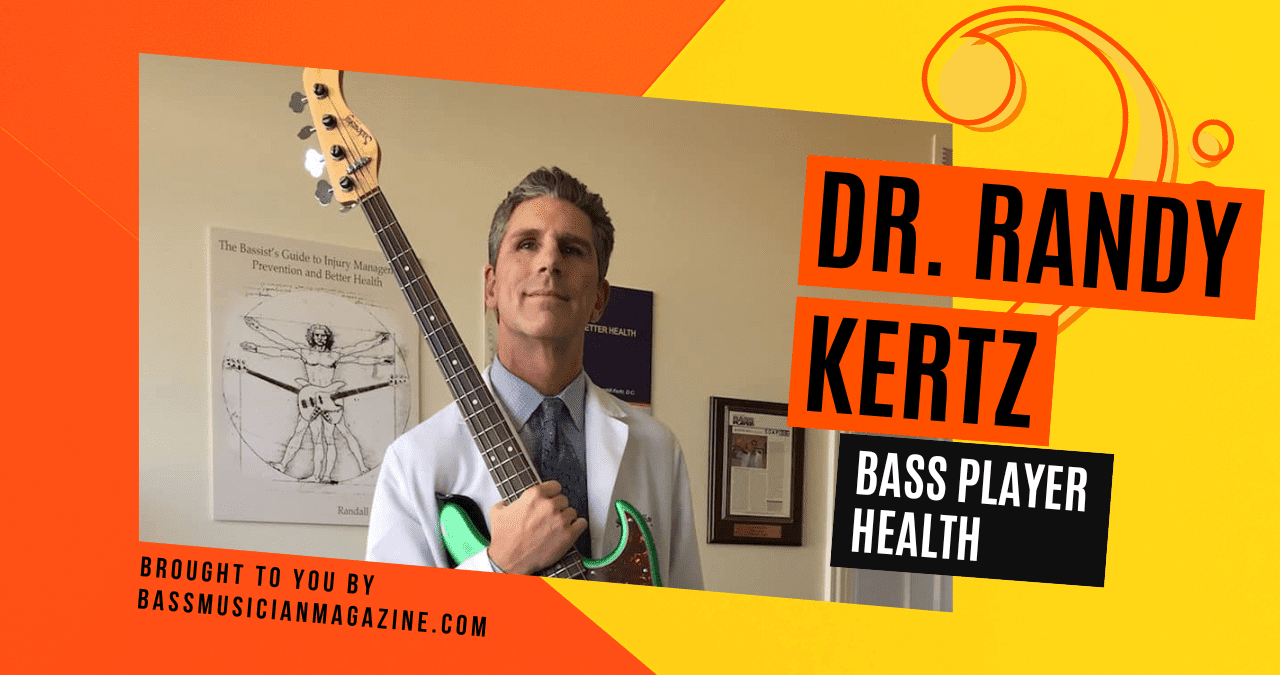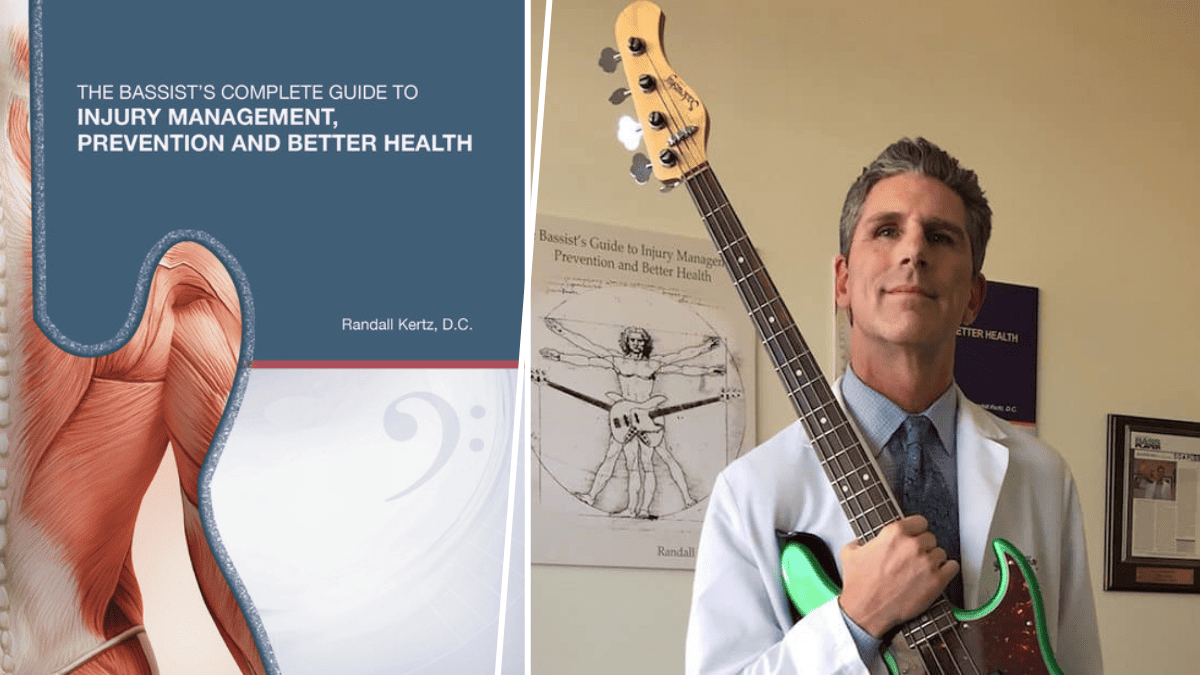Bass Player Health
Bass Playing and Occupational Therapy – Meet Rodney Jones

By Guest Writer, Andrew Waite
Rodney Jones leans back in his chair, the soundboard and music studio behind him. He wears a black baseball cap backward and a long chain around his neck as he’s interviewed about his bass playing in a YouTube video uploaded in 2010.
Jones smiles often as he converses, and does a lot of talking with his hands. During one point in the video, his interviewer asks him about a recent single Jones co-wrote with gospel singer and pianist Smokie Norful. Jones nods his head and swivels his chair, clenching his left fist, which punches the center of the screen as he rotates. When Jones filmed the interview, he wasn’t thinking about that left hand or its positioning in the frame. He was thinking about his musical career, lost in a question-and-answer session about his sound, style, and groove.

“When I was a kid, they asked me what I wanted to be, and I said fireman,” Jones recalls with chuckle.
But when Jones’s grammar school choir needed a bassist, who was he to deny his lineage?
“So I started playing. And from that point on I have been a musician all my life,” he says in a gravelly voice fit for radio.
His mom, LaWanda, 48, immediately saw her son’s love for his instrument.
“He was very happy, very loving. He just had a passion to do it, and that was something that he strove to do really well. It meant more to him than doing homework, than going outside to hang out with the boys in the neighborhood,” LaWanda Jones says.
By 2006, Jones had made it. He was first call for many prominent musicians, including Avant, Stephanie Mills, and Donald Lawrence. First call means Jones fills in if an artist’s bassist is sick and can’t make a gig, no matter how prominent the venue.
He was playing venues like Chicago’s United Center, Los Angeles’s Staples Center and the Pori Jazz Festival.
On October 8, 2011, Jones flew back to Chicago from Washington, DC. He’d spent the past few days in the nation’s capital playing in a gospel and jazz festival. Two days later, Jones thought that might be the last concert of his life.
“It’s about 2 am on a Monday morning [Oct. 10, 2011.],” Jones recalls. “I was a passenger of the motorcycle. I was riding and she lost control on the expressway. When we hit the wall I went rolling and flipping… I flew for about a block. I really don’t remember seeing it because I had the helmet on.”
Jones went to the emergency room.
“I guess my adrenaline was still rushing, so the pain that they were expecting me to feel hadn’t kicked in yet,” Jones says. “I just wanted to go home and go to sleep and take a bath, but they told me I skinned my pinky down to the bone and lost all the tissue and muscle as well as [critically damaged] my left knee.”
LaWanda was horrified when she saw her son in the hospital.
“I couldn’t really look at him with the condition he was in. It was hard. His hand is messed up and his leg and stuff. Sometimes you see things and you just really start thinking the worst,” she recalls.
Jones needed a series of surgeries to repair the shredded left side of his body. After the procedures, Jones was in a wheelchair and couldn’t walk. But that’s not what upset him most.
“I didn’t see my hand until maybe 4 days after the surgery,” Jones recalls. “When I saw my hand I pretty much fainted. At that point I said that my music career was over. I was trying to think of other professions that I could pursue. So I counted it as a loss.”
Because of the plastic surgery required to repair his skinned hand, the extremity was stiff, seemingly frozen in a high-five position.
“The doctor was telling me that he wanted me to start making fists as soon as possible, and I couldn’t move my hand a half an inch toward a fist,” he says.
That’s when Jones was introduced to Sean Clancy, OTR/L, CHT, Hand Therapy program Coordinator at the University of Chicago Medical Center.
“So the functional problem, the main problem, was his livelihood. He’s a professional bass player. The bass is four strings and the frets are pretty big, so it takes a lot of strength to push those things down,” Clancy says. “The guy’s a pro, so he could play with two fingers better than I probably could after 3 years. But he couldn’t play like he did. And he really prides himself on his tone, and his sound is kind of quick and funky, so he goes up and down quickly and he needs his pinky to reach up and abduct out. That was impossible at the time.”
Jones couldn’t shake a defeatist mentality.
“It was a major downer moment, depression moment, because in my career, normally, whatever I do I am always the best,” Jones says.
Fortunately, Clancy believed in his client. The therapist worked on scar mobilization in Jones’s tendons, strengthened range of motion, and employed custom-fabricated orthotics to help stretch the web space in Jones’s hand. Clancy also pushed Jones to make a fist.
“He said that if I didn’t make a fist now, later it was going to be harder to make that fist. So pretty much he just kept having me going through exercises of having to close my hand and open it,” Jones recalls. “It was a lot of pain because every time I would stretch it past one point to get to the next level, and my hand would swell up. Then I’d be sitting with a balloon for a left hand.”
Slowly, Jones made progress. And after a few weeks, there was nothing left to do but play the bass––even if Jones could only use two fingers on his left hand.
“[Clancy] kept advising me to go play, play, play, play. It helps when you are working with someone who has such a positive attitude,” Jones says.
When not in therapy, Jones did his homework and constantly tested his range of motion. He regularly utilized Clancy’s splints to help expand his web spacing.
By December, Jones could almost make a full fist. His pinky only needed another quarter of an inch to reach the palm.
“I was playing with three fingers and the week after that I am playing with my pinky and it wasn’t hurting. So when I realized that my career wasn’t over, I came out of depression,” Jones says.
Clancy saw the change in his client.
“Now it’s like the artist has come out. The marketer, the fast talker, the charmer. He’s totally back to himself. He’s working. He’s doing the stuff he’s supposed to do,” Clancy says.
Jones even claims he is playing better now than at any point in his career. Consequently, he just released a new solo album. To find out more about Jones and his music, visit www.rodneyjonesjr.com.
“Going to therapy is like going to the gym. It’s exercising, so you have no choice but to get stronger. [Clancy] showed me a lot of these different techniques and exercises on what to do, how to spread my fingers apart, and how to strengthen all the muscles in my fingers,” Jones says. “So at first let’s say I am playing for an hour or two. A lot of times my pinky may get tired because the pinky is the weakest finger on your hand. Now, my pinky is the strongest finger on my hand because I had to work it out so much.”
The recovery process taught Jones about the robustness of his self-discipline. Before, he never would have imagined adhering to such a strict exercise and stretching routine. In fact, going to therapy and strengthening his hand inspired Jones to purchase a gym membership and get the rest of his body in shape.
“I approach my instrument differently now,” Jones explains. “I approach it professionally, of course, but now I also know the pain that has been there. I know the feeling of hurt.”
And as for that fist––once the source of stinging agony?
“No pain,” Jones says. “Every time I make a fist now there is just joy.”
Andrew Waite is the associate editor at the American Occupational Therapy Association. He can be reached at awaite@aota.org or at 301-652-6611 x 2853. The American Occupational Therapy Association: www.aota.org.
© 2012 American Occupational Therapy Association
Bass Player Health
What is a Pinched Nerve? with Dr. Randy Kertz

What is a Pinched Nerve?
In this month’s video, we will cover how to tell if you have a pinched nerve and when to seek professional help.
Dr. Randall Kertz is the author of The Bassist’s Complete Guide to Injury Management, Prevention and Better Health. Click here to get your copy today!
View More Bass Health Articles
Bass Books
The Bassist’s Complete Guide to Injury Management, Prevention & Better Health

The Bassist’s Complete Guide to Injury Management, Prevention & Better Health is now available!

A compilation of Volumes 1 & 2 of the acclaimed Bassist’s Guide with 20+ pages of new interviews, techniques, and conditions, The Complete Guide puts everything in one convenient place.
Available at Amazon.com and from our friends at Bassline Publishing
Follow Dr. Kertz’s Bass Player Health at Bass Musician Magazine
Bass Player Health
Do You Have Trigger Finger? with Dr. Randy Kertz

Do You Have Trigger Finger?
In this month’s video, we will cover trigger finger and possible treatments.
Dr. Randall Kertz is the author of The Bassist’s Complete Guide to Injury Management, Prevention and Better Health. Click here to get your copy today!
View More Bass Health Articles
Bass Player Health
Play Every Note with Dr. Randy Kertz

Play Every Note…
In this month’s video, we will cover the best approach to practice on your bass fretboard.
Please make sure to cast your Vote for Dr. Kertz >>> CLICK HERE
Category: Audio Education Technology
Title: Injury Prevention & Management for Musicians – The Pianist’s Guide
Dr. Randall Kertz is the author of The Bassist’s Complete Guide to Injury Management, Prevention and Better Health. Click here to get your copy today!
View More Bass Health Articles
Bass Player Health
Believe the Hype… Internet Wisdom, with Dr. Randy Kertz

Believe the Hype… Internet Wisdom…
In this month’s video, we will shed some light on Internet wisdom and how to proceed.
Dr. Randall Kertz is the author of The Bassist’s Complete Guide to Injury Management, Prevention and Better Health. Click here to get your copy today!
View More Bass Health Articles









